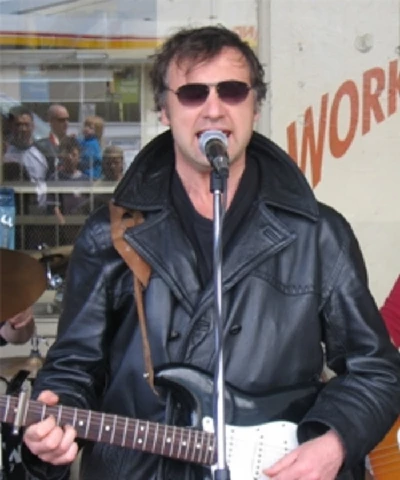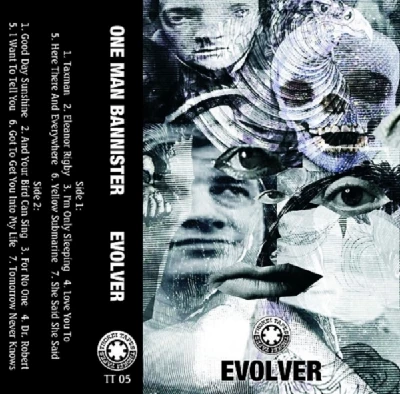published: 8 /
11 /
2019

New Zealand singer-songwriter One Man Bannister tells Lisa Torem about his new interpretation of a classic Beatles record.
Article
Back when One Man Bannister still went by his birth name of Matthew, he created the 18-track debut album, 'Moth', a diverse project boasting catchy melodies, bright harmonies and a litany of drones and bleeps.
Highlights included 'Talk of the Town', underscored by swirls of rejuvenating samba beats, and in complete contrast, 'Daddy's in the Hospital' which centered around sobering reflections. And clocking in at under two minutes is the sophisticated synth-strumental 'Balmoral Bash'.
Given the curious mix of tempos and storylines it seems safe to assume that the common denominator is arguably OMB's warm, expressive vocals and approachable themes. But years later something drew OMB to explore an entirely different terrain. In his first Pennyblackmusic interview the New Zealand-based singer/guitarist/songwriter discusses his latest offering, 'Rubber Solo', which is based on 'Rubber Soul' and which is a follow-up to 'Evolver,' ('Revolver'), the first project in which he set out to reconstruct famous Beatles material.
But why did OMB choose to reimagine those particular albums? And after having made that decision, how did he go about reimagining classic songs? Read on to hear about One Man Bannister's compelling musical choices.
PB: Can you tell us the story behind your name? Do you refer to yourself as "One Man Bannister" because you essentially rely on your own vocals and instrumentals in the studio?
OMB: It wasn't my name. Someone else thought of it, a bit like the title of the album. With the latter I was looking for someone to design the cover, but I hadn't quite decided on the title, maybe 'Rubber Gold'? But I asked Ian Dalziel, who designed the last Sneaky Feelings album cover, and he immediately said, "I suppose you're gonna call it 'Rubber Solo'." I was like, "You've got the job!"
PB: Do you come from a musical family? Are you self-taught?
OMB: Not a musical family background in general. They listen to quite a lot of music, though. My wife Alice and I play quite a lot of music together in ukulele orchestras. I play string bass. And my sons Tom and Albert play. Albert's in my band.
PB: You are originally from Dunedin but now live in Auckland, New Zealand, right? Both regions are especially rich in musical culture. Have these influences informed your arrangements?
OMB: Actually I'm originally Scottish. I moved to Dunedin in 1979. I would say that playing in a Flying Nun band was probably an influence in the sense that they were mostly guitar bands, and I usually write on guitar. New Zealand is quite a musical place, or it seemed that way to me when I first moved there, compared to Scotland, where I didn't know anyone in a band. But I suppose that would have changed if I'd gone to university in Scotland.
PB: In 2007 you released your solo album 'Moth' after having formed and worked with the Dribbling Darts. How did you enjoy being a band member, as opposed to later becoming a solo artist?
OMB: I definitely prefer being in a band now. In the Dribbling Darts I was a bit of a control freak, but eventually I realized that it's more fun if you let people do their own thing and feed off it.
PB: How would you describe your choice of material on 'Moth'?
OMB: 'Moth' was the result of me getting a computer for home recording. I got very inspired, I was writing a lot of material, and spent a lot of time recording in the evenings, hence 'Moth' seemed like a good title. Previous to that, I had a Tascam four-track recorder, but the quality was better with a computer, obviously. I wasn't playing live much but I was keen to do something musical so I ended up playing with myself, so to speak. It was a lot looser than anything I'd done before. Also it's not mastered properly. But maybe that suits the material. A lot of it is crazy stuff that I could never do live.
PB: What was it about the material in 'Revolver' and 'Rubber Soul' that piqued your interest?
OMB: I'm just a big Beatles fan, really. 'Evolver' came out of a Wintec [the technical school where OMB works] thing where music students would recreate a famous album in a day. We missed the deadline but then I started doing demos myself. 'Rubber Soul' is like Revolver's brother or sister really – if you do one, you've got to do the other. 'Pepper' would be too hard, because it's about atmosphere, really. 'Hard Day's Night' is the other one I'd consider – that's a great album. 'Abbey Road' is more about production. I guess 'Rubber' and 'Revolver,' cos they're in the middle – you get just the right blend of youthful enthusiasm and adult knowing-ness.
PB: How do you go about reimagining time-tested material, whilst making sure that the arrangements carry your stamp?
OMB: I just pinch a lick and see how it sounds with the Beatles on top! With 'Drive My Car', I copped the basic feel from Nick Drake. You either change the chords or the meter/rhythm or the kind of genre references. At the same time, you usually try to do something the Beatles might have done – I wouldn't do a techno Beatles cover (although I did a baggy 'Tomorrow Never Knows', but then that was close to Britpop, which is 90s Beatles). With 'Rubber Solo', I found I was copying less from the '60s and more from the '70s, a bit of T Rex for example. With 'If I Needed Someone', I changed the meter to 7/4. I learned this from singing in a choir where we did a lot of Eastern European stuff which is often in odd time signatures.
PB: For your production of 'Rubber Solo', you draw from a number of styles. As a self-confessed Beatles fan, I couldn't help but compare your work to the originals. The late John Lennon's vocals on 'Run for Your Life' were unapologetically threatening, but your version reveals a softer edge. Lennon's vocals on 'Girl' were enhanced by romantic sighs, but in my opinion, you focus more on the harmonic structure. What were some of the choices you made as you reviewed the songs?
OMB: I made the album quite quickly, unlike 'Evolver' which took a while. When I looked back over 'Rubber' I noticed that I'd used some of the same chord sequences on different songs. Well, a bit of repetition never hurts, I guess. There's a lot of chromatic stuff, and quite a lot of drone, or jangle, if you like, which arguably comes from the Dunedin Sound thing, although that in turn comes from 60s folk/psychedelia. I've always been fascinated by drone, I guess it's the way it ties everything together, and of course it was something the Beatles started exploring on 'Rubber Soul' with the sitar and the organ drone on 'You Won't See Me', or 'The Word', which is mostly one note. They should've called it 'The Note' but I guess they left that one for Pete Townshend to pick up on.
PB: What was your technical criteria for recording 'Rubber Solo'? Were you the producer?
OMB: It's all self-produced. I'd just got the Logic Pro X software, which does a lot of the work for you. Jason Long, a Wintec colleague, mastered it. It's quite good to produce yourself, it demystifies the process. But I haven't got the ears of someone like Ed Cake of Bressa Creeting Cake, my fave NZ band, who produced Aroha Ave.
PB: Are you currently on tour in support of 'Rubber Solo'? What's your typical live set-up?
OMB: We're doing some gigs in early November with a four-piece band: me on guitar and vocals, Bruce Dennis on drums, my son Albert on bass and Nick Braae from Wintec on bass and keyboards. I'm not sure who will come to the gigs - mostly ageing indie people like myself, I imagine. There are plenty of mainstream Beatles fans in NZ but they're mostly pretty straight, and probably not interested in this kind of re-interpretation.
PB: Are you committed to the "one-man" approach? Would you consider becoming part of a band again?
OMB: I have bands too. The Changing Same is my current band, with Bruce on drums and John Maydon on bass. I actually prefer playing in bands – it's the social aspect I think.
PB: What else would you like to share with your Pennyblackmusic fans about your career?
OMB: Sneaky Feelings have done another album and it'll probably come out next year. As with 'Rubber Solo', we'll probably do a vinyl edition too. No one buys CDs anymore. It's kind of ironic as I don't have a record player (shock). I don't really care about formats to be honest, I just like music.
PB: Thank you.
Band Links:-
https://thokeitapes.bandcamp.com/album
Picture Gallery:-
